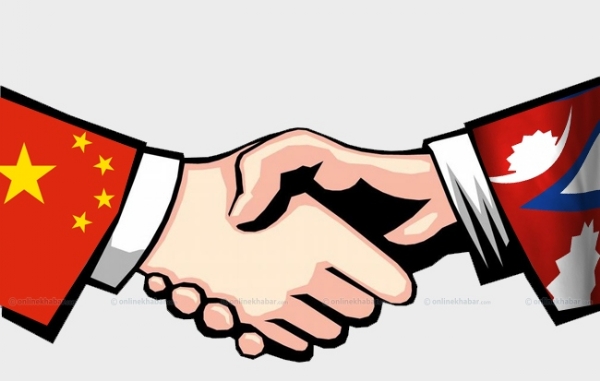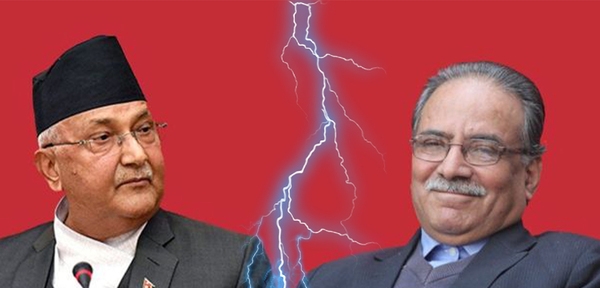Why China does not wish to see a split within the Nepal Communist Party?
Total Views |
Recently, Nepal winded up into a political crisis after rising discontent against Prime Minister K P Sharma Oli's leadership and feuds within the ruling party due to which he effected a constitutional "coup" by suddenly dissolving the 275-member House of Representatives. Thereafter, President Bidya Bhandari announced the dissolution and declaring fresh elections in May 2021, sparking protests from a large section of the NCP led by Pushpa Kamal Dahal ‘Prachanda’. This rift inside the ruling party did not happen overnight. Amidst this tussle, it is understood that Oli will be going up against Prachanda, who is also the executive chair of the ruling Nepal Communist Party and also a former PM.

There has been a mild rivalry that is turning drastic between the two communist leaders, which has led to the ultimate split in the party. In a meeting, Oli had rejected Prachanda’s accusations that he was running the government without consulting the party, and instead blamed the rival group of non-cooperation in settling party affairs. Oli had submitted a separate 38-page political document in response to the allegations made by Prachanda in his 19-page political paper presented at the Secretariat meeting on 18 November.
In all this political chaos, China has been closely watching these developments and reaching out the Nepalese government officials to play make things 'right' for their own good. China does not wish to see a break-up of the Nepal Communist Party. According to the Kathmandu Post, China is sending Guo Yezhou, vice-minister of the International Department of the Communist Party of China (CPC) to Kathmandu in what is believed to be Beijing's effort to assess the ground situation.

However, this is not the first time, a Chinese delegate is visiting Nepal to peace out things within the Nepal Communist Party. Earlier, a Chinese ambassador Hou Yangi had met senior communist leaders including Oli, Prachanda and Madhav Nepal in Nepal in a bid to save party unity. It is not only about the Chinese embassies calling on NCP. Leaders from the two communist parties had also held a virtual meeting during which they discussed the current political situation and shared their experience in running the party and government.
China has also been investing in the multi-billion-dollar Belt and Road Initiative including the building of the Trans-Himalayan Multi-Dimensional Connectivity Network. Apart from trade and connectivity, China has also enhancing defence relations with Nepal. The recent one being Chinese Defence Minister Wei Fenghe visiting Kathmandu. It is the highest level visit from Nepal’s northern neighbour since President Xi Jinping visited Kathmandu in October 2019. Upon arrival, Wei said, “My visit is aimed at enhancing mutual military assistance and strengthening the existing ties between the two countries. Ties between China and Nepal are strong and I am here to take this relationship to a new height." He spent much of the day in the Nepali Army (NA) headquarters and engaged in dialogue with NA Chief Gen Purna Chandra Thapa. Clearly, the visit was aimed at further strengthening the Nepali Army’s relationship with China.
This clearly shows a clear picture that China wants to ensure a stable government in Nepal. Meanwhile, India has not spoken about the development saying it is a Nepal's internal matter. However, it is keeping an eye on the events, given the testy relations with Nepal in the past year. These turn of events might not be in favour of China either as its ambassador in Kathmandu has been working to keep the NCP united.
Besides, India and Nepal have been at odds since the map-making controversy last year, as the Oli government moved to amend the Nepalese constitution to show Indian territories as Nepalese. This led to several months of frosty ties between India and Nepal, at a time when Kathmandu was actively courting China, and India and China were in a stand-off in eastern Ladakh.
Today, Defence Minister Rajnath Singh said that no "meaningful solution" has come out of diplomatic and military level talks with China to resolve the standoff on the Line of Actual Control (LAC) in eastern Ladakh and there is "status quo".
However, it took a phone conversation between Oli and Narendra Modi to break the odds. Following the telephonic conversation, India has separately sent RAW chief Samant Goel, Army chief Gen MM Naravane and foreign secretary Harsh Shringla to Kathmandu. Even the CDS General Bipin Rawat said, "India's goodwill towards its neighbour comes with no strings attached", and warned Nepal to be wary of China. Speaking at an event, CDS Rawat, said that Nepal is free to act independently in international affairs, however, without naming China, he warned Kathmandu to be cautious when signing agreements with "other countries" in the region.


